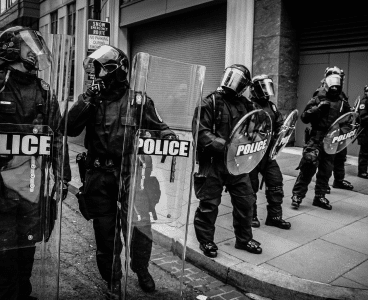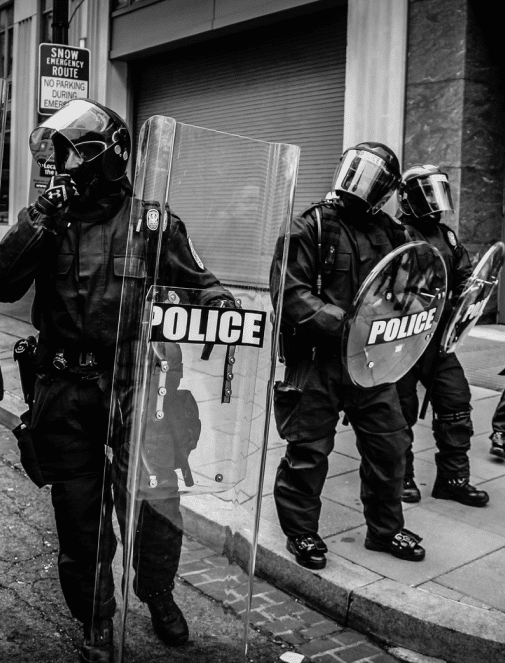Kansas City Police Brutality Lawyer
Kansas City, Missouri, has a long history of racism and police brutality. Cases of police violence against citizens resulting in severe injuries and death continue to appear in the headlines and charge public discourse in the city. If the police have violated your constitutional rights, the Police Brutality Center can connect you with a Kansas City police brutality lawyer to discuss your options for pursuing compensation.
Were you or a loved one a victim of police brutality?
Attorneys that work with Police Brutality Center may be able to assist you.
"*" indicates required fields
Content Last Updated: May 2, 2025
Police brutality is an enduring problem across the United States, and Kansas City, Missouri, is no exception. The city has a history of racial profiling and police brutality, and concerned citizens have asked the Department of Justice to intervene.
If you or a loved one was a victim of police brutality, the Police Brutality Center can help. We will connect you with an experienced Kansas City police brutality lawyer who can help you decide whether to pursue compensation.

Police Misconduct Laws in Kansas City

Several federal and state laws address police brutality in Missouri. Police brutality victims can file civil lawsuits at either the state or federal level. The state or federal government can also bring criminal charges against police officers.
Under 42 U.S.C. § 1983, people may file a federal lawsuit against the police for violating their constitutional rights. These are often called Section 1983 lawsuits. To win a Section 1983 case, your attorney must prove that the police violated your constitutional rights.
In addition, the Police Misconduct Provision of 34 U.S.C. § 12601 allows the U.S. Department of Justice to file suit against a police department for engaging in a pattern or practice of unconstitutional conduct. This law has paved the way for consent decrees ending specific harmful practices, such as chokeholds.
Missouri law covers police officers’ use of force under Mo. Rev. Stat. § 563.046. This law only allows officers to use an amount of physical force that is “objectively reasonable in light of the totality of the particular facts and circumstances confronting the officer on the scene.”
To pursue compensation, you typically must file a lawsuit within Missouri’s applicable statute of limitations for personal injury cases. Thus, you generally have five years to file a Section 1983 lawsuit over the assault by an officer and three years to file a wrongful death suit.
Kansas City Police Department History
The Kansas City Police Department has a long reputation for excessive force and civil rights violations. It is the only major city where the state controls the police department. It does so through the Board of Police Commissioners, which is comprised of the mayor and four other members appointed by the governor.
State control dates back to the Civil War era. Governor Claiborne Fox Jackson favored joining the Confederacy, but his attempts failed. To help “control” the Black population, Jackson instead seized control of the St. Louis Police Department. The city had a higher percentage of Black residents than other parts of the state.
Kansas City also had a large Black population. When it formed its police department after the Civil War, the state seized control. This move encouraged corruption and allowed racist state officials to make police policies for the city. The firing or criminal prosecution of police officers in Kansas City for assaulting and killing minorities was unheard of.
Today, the state still controls the police department budget and policies and hires the police chief. The citizens of Kansas City have little say in decision-making, and their elected mayor has only one vote out of five on the policymaking board.
Cases of Police Brutality in Kansas City, Missouri
Despite the costs of lawsuits, losses of human life, and the degradation of citizens’ constitutional rights, the Kansas City Police Department hasn’t significantly changed. Its officers continue to abuse citizens, especially those of color. Below are some recent examples of police violence in Kansas City:

Mack Nelson - 2022
A Kansas City police officer slammed Mack Nelson to the pavement, causing injuries to his face, shoulder, and body. Officers said Nelson fell, but surveillance and witness video proved that was false. The police department settled for $500,000.

Malcolm Johnson - 2021
Kansas City Police shot and killed Malcolm Johnson in a gas station. The police claimed he resisted arrest, drew a gun, and opened fire. Johnson’s family denies this account. No charges were filed against the officers, and the family has asked the Department of Justice to investigate.

Terrence Bridges Jr. - 2019
A Kansas City police officer shot and killed Terrence Bridges Jr. after a foot chase. The police claimed Bridges pulled a gun, but an investigation found that he was unarmed. The Kansas City Police Department settled with Bridges’ family for $5 million. No officers were charged criminally.

Cameron Lamb - 2019
Kansas City police officer Eric DeValkenaere shot and killed Cameron Lamb while he was backing his truck into his garage. DeValkenaere was convicted of second-degree involuntary manslaughter and armed criminal action. His criminal case is still on appeal, and a civil suit is pending.
Kansas City Police Brutality Lawyers
Several civil rights lawyers handle police brutality cases in Kansas City, including the following:
John Picerno has represented several clients, including Mack Nelson, in lawsuits against the police.
Tom Porto of Popham Law represented the family of Terrance Bridges Jr.
Denning Law Firm and attorney William Demming represented the family of Robert White and several other victims of police misconduct.
David R. Smith has handled several police brutality cases, winning settlements in the millions of dollars.
Why Work With a Police Brutality Lawyer?
It is challenging to overcome legal hurdles and successfully sue police departments. Officers claim qualified immunity, which protects them against liability when they believe they are acting lawfully. To overcome this defense, your attorney must show that officers violated your clearly established constitutional or statutory rights.
In addition to helping you overcome that defense, an experienced Kansas City police misconduct lawyer can help you by:
- Asking the court to compel the release of evidence such as body camera footage
- Investigating the circumstances of your case
- Interviewing witnesses reluctant to talk to the police
- Looking into the past conduct of the involved officers and the department
- Procuring expert testimony
- Determining where to file suit
- Calculating your damages
If you succeed in a lawsuit based on police misconduct in Kansas City, you may receive damages for your medical bills, lost wages, and pain and suffering. You may also ask for punitive damages if the officers’ conduct fits the definitions established by RSMo 510.261. Punitive damages are reserved for the most egregious cases.
Filing a Civil Rights Claim in Kansas City
People who are victims of police misconduct can file a complaint with the Office of Community Complaints. You must file within 180 days of the incident.
Since 2020, outside agencies have investigated Kansas City Police shootings. The Missouri Highway Patrol handles most of these investigations, but the city can also consult the FBI.
You also have the option of suing the police department. An experienced Kansas City police brutality lawyer understands the applicable state and federal statutes and can help you decide where to file. Your lawyer will help protect your rights and follow the proper procedures as your case progresses.
If you aren’t sure whether to file, the Police Brutality Center can help. We will connect you with a Kansas City police brutality lawyer who can answer your questions and advise you on what to do based on the circumstances of your case.

Police Reform in Kansas City
Several police reform efforts are underway in Kansas City. Seemingly unending instances of police brutality have merited changes in how the Kansas City Police Department hires, trains, and disciplines its officers.
Civil rights organizations are pushing the Justice Department to do a detailed investigation of the Kansas City Police Department. They have specifically asked the agency to investigate constitutional violations, excessive force complaints, and discrimination against Black residents.
The Civil Rights Division of the Department of Justice has launched an investigation into the Kansas City Police Department’s employment practices.
Kansas City Mayor Quinton Lucas asked the Board of Police Commissioners to make several changes to the Kansas City police department, including:
- Enacting a law establishing a legal duty for police officers to intervene when another officer uses excessive force
- Enhancing whistleblower protection for officers who wish to report other officers' misconduct
- Making the Office of Community Complaints independent rather than part of the Kansas City Police Department
- Allowing third-party complaints of police misconduct so witnesses to police brutality can come forward when victims are afraid to
Other changes Mayor Lucas suggested are now in place. These include allowing minors to file complaints and extending the time to submit police misconduct complaints from 90 to 180 days.
Get Legal Help
If you or a loved one were subject to police brutality, get legal help with the guidance of the Police Brutality Center. We may be able to connect you with an experienced Kansas City police brutality lawyer who can help you decide whether and how to pursue compensation.

